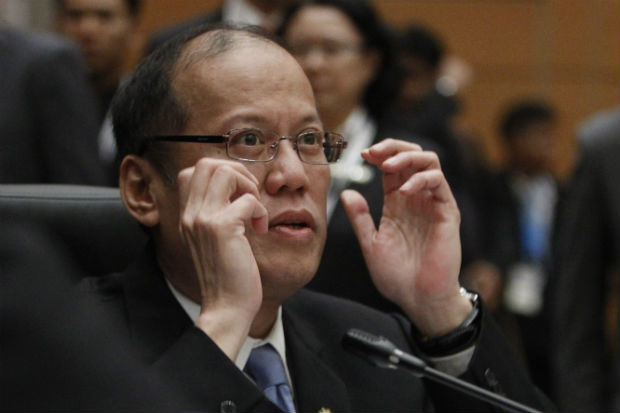
President Benigno Aquino III gestures before the plenary session of the 26th ASEAN Summit in Kuala Lumpur, Malaysia, Monday, April 27, 2015. AP
LANGKAWI—President Aquino on Monday night urged his fellow Association of Southeast Asian Nations (Asean) leaders to speak as one on China’s “aggressive action” which undermines the Declaration of Conduct (DOC) in the South China Sea.
“Others have spoken. Now, it behooves all of us in Asean to collectively speak with one voice,” President Aquino said in his intervention at the Asean Leaders Retreat.
He emphasized the need to promote regional security “built on the primacy of the rule of law.”
President Aquino said the Philippines, for its part, has “sought an open, durable, and rules-based dispute settlement through international arbitration.”
“We have done this to preserve a valuable partnership, to promote regional stability and uphold respect for the rule of law, particularly for Unclos,” he said.
“Indeed, for many years, Asean has tried to fully implement the 2002 Asean-China Declaration on the Conduct of Parties in the South China Sea or DOC and to negotiate a binding Code of Conduct in the South China Sea or COC,” he said, stressing:
“Unfortunately, the massive reclamation activities in the area undermine the relevance of both the DOC and of any eventual COC.”
Aquino said China’s massive reclamation in the disputed seas also challenges the Asean centrality.
“All our efforts at regional community-building aim to promote and protect the future wellbeing of our peoples, and this can only be done in a secure and stable environment. If we continue to work shoulder-to-shoulder, I am confident our vision of an integrated Asean Community that is people-oriented, people-centered and people-driven, is within reach,” the President said.
He said China’s “continuing aggressive behavior” shown by its massive reclamation “has tremendous environmental impact, damaging the marine environment and threatening marine biodiversity, affecting livelihoodS and food security of coastal states.”
“Thus far, the loss and damage of hundreds of acres of coral reefs in the Spratlys is estimated to cost the fisheries sectors in the littoral states at least $100 million per year,” he said.
Aquino expressed gratitude to the international community, including the G-7 countries, “for taking a clear stand and for their calls to action in response to these illegal, massive reclamations.”
Since last year, China has ramped up its construction of artificial islands on the reefs and shoals in the South China Sea.
Filipino scientists estimate that China has reclaimed more 300 hectares of land, destroying not only the natural features of the South China Sea but also the marine environment in the area.
Military and defense experts, on the other hand, say that the islands have become forward operating bases for China’s naval and air force.
With its so-called nine-dash line claim, China has practically declared entitlement to nearly the entire South China Sea, a major sea-lane for global trade. But other Asean claimant countries like the Philippines, Vietnam, Malaysia and Brunei are disputing China’s claim.
At almost every Asean Summit, Aquino had called on his fellow leaders for a swift passage of the COC, a legally binding agreement between the Asean and China on how all claimant countries should behave in seeking a resolution of the maritime dispute.